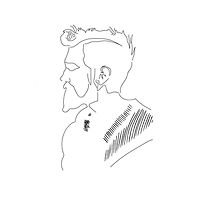FAQs
How do I submit a work?
Check out our 'How To Submit A Work' page for more information.
What does winning The Barbellion Prize entail?
We aim to award the winner of the prize £1000 - currently funded by donations. We are continually discussing the potential growth and nature of the prize, meaning that when we have greater support, and the administrative capability, we want to award each author who makes our shortlist with a monetary sum, while a trophy would go to the overall winner as first among equals. These are future prospects and currently the prize remains a modest effort in the broader literary landscape to reward disabled authors.
What makes one eligible for the prize?
Eligibility for the prize is predicated on the author’s presentation of life with a long-term chronic illness or disability, whether that be in the form of blindness, MS, cystic fibrosis, dwarfism, or another comparable condition that may substantially define one’s life.
Authors - such as those in a carer's capacity - who themselves are not disabled may be considered for the prize if their work is truly exceptional as an articulation of life with illness, but authors who themselves deal personally with illness or disability will take priority in any selection for the prize.
If you are an author, agent, or publisher wishing to submit a work, please consult our 'How To Submit A Work' page.
What is important to us is not just any particular moral or message in a given work... but more so a greater visibility for, and a genuine illustration of, life with illness, disease, impairment, or disability.
What is the structure of the prize?
In each prize year, we curate a longlist of eight books (decided in December), a shortlist of four (decided in January), and a winner (decided in February). The judging committee consists of three judges, each of whom is disabled, overseen by the director of the prize, who handles administrative tasks along with the advisory panel and trustees (see the Meet Our Judges page).
I may be disabled, but must I write exclusively about disability?
No. Ill and disabled people are often 'pigeonholed', and if you are a disabled author, your plot or the main narrative of a work need not entirely be about disability. What we ask for is that disability or illness is at least represented somewhere - even if only implicitly or as a secondary consideration. If the work contains absolutely zero reference at all to disability or long-term illness, then it is likely not the sort of work we are looking for. As an example, one could write a crime novel where the protagonist is disabled, while disability is not the main focus or narrative of the work. Nonetheless, disability should at least, in some capacity, be represented or present and extant in any work considered.
Are authors with health problems such as mental illness or cancer eligible for the prize?
The Barbellion Prize is intended mostly for people with chronic, life-long conditions – whether congenital, or acquired as adults. It’s never easy to define exactly who’s in, and who’s out - as disability is dynamic and complex. There are already prizes specifically for people with cancer or people with mental health conditions, and this prize is not intended to duplicate or overlap with those. It is also true that literature on the subjects of cancer or depression and mental illness exists in a far greater quantity than literature on other varieties of disability. While this is a consideration for us when we look at submissions, this does not mean we will reject them - and we will still consider any submissions. The Barbellion Prize is neither intended for those with disabilities that do not much affect their participation in society. Many, but not all of those eligible will live shortened lifespans, due to CF, MD, MS, and various other conditions.
But this is not a prize simply about ill-health or medicine. It is a prize which celebrates and recognises alternative ways of living and finding meaning.
If potential applicants are in any doubt about their eligibility, please contact, in confidence, the administrator of the prize. The decision of the administrator and judges shall be final.
A list of longlisted and shortlisted authors will offer further indication as to what we are looking for in the future.
Who was Barbellion?
W.N.P. Barbellion (Bruce Frederick Cummings, 1889 – 1919), was an English diarist and naturalist who was diagnosed with 'disseminated sclerosis', otherwise known as multiple sclerosis (MS), before WW1.
He wrote eloquently, controversially, and movingly about his life, health, nature, observations on culture and society, and his impending death in The Journal of a Disappointed Man, as well as in his A Last Diary ; regarded by some as among the most moving diaries ever written: comparable in merit to Franz Kafka and James Joyce.
Indeed, Barbellion's work is perhaps "the most remarkable example of self-reflection that has ever been printed."
The Barbellion Prize is named in his honour, in homage and in tribute to him, as he is an exemplar of the sort of work made possible under such terrible circumstances and to the power of writing - as a way to embolden oneself and contend with the realities of illness.
You can find W. N. P. Barbellion's complete works here in the public domain - https://www.pseudopodium.org/barbellionblog/
Why was The Barbellion Prize created?
The idea to create a book prize for ill and disabled authors came to Jake Goldsmith in the process of writing his own memoir, Neither Weak Nor Obtuse. Jake’s memoir is about how his life with cystic fibrosis and continued ill health defines his view of the world, his personality, his philosophy, and his view on impending death.
Later in the book he reflects on the wider public perception of illness, sickness, and disability, and how disabled people are often discriminated against, overlooked, and especially misunderstood. A new edition of Jake's memoir has been published by Sagging Meniscus Press.
He also reflects on the history of literature and writing on illness, and the idea of writing as a method of emotional ventilation: a way to help oneself and others understand or simply contend with these experiences.
Writing is a brilliant way for ill and disabled people to make some sense of what they experience. Yet the history of disability literature, or the public awareness of illness, impairment, and sickness, is still comparatively limited. And it is still too commonly turned away from, ignored, scorned, or we discriminate and ridicule when we do confront it.
Many around the world with long-term illnesses or disabilities do not have a voice that is heard, and indeed may be among those who are the least acknowledged in our communities. It can take a lot of time and energy to be ill, and many do not have the luxury of being able to write about their lives, or be creative, or even have the opportunity of an education in order to do that. And it would surely be better if we could see and celebrate these lives more.
No matter how ubiquitous it is, illness and disability will still not be given proper attention, or it is shamed and mistreated in everyday life. Disability can become a reality for anyone, and yet we will still neglect it or find room for injustice. And in literature, it is still not one of the more essential or primary themes when it perhaps deserves to be - given its significance and pervasiveness.
As such, The Barbellion Prize was created to espouse the existence of ill and disabled writers, and to reward authors for their good work and efforts.
___
A statement from our founder and prize director, Jake Goldsmith:
Illness is ubiquitous, but it is often neglected or it is thoroughly misunderstood. There is a long history of great artists and writers living with illness, from Franz Kafka, Emily Dickinson, John Keats, Katherine Mansfield, Friedrich Nietzsche, Albert Camus, Audre Lorde, and many others (see our 'Authors Old & New' page).
All of these writers produced estimable work partly because of (and not despite of) their illnesses and the distinctive perspectives illness gave them; implicitly or explicitly.
Their spiritual legacy still exists today, and should be celebrated.
The experiences of those who are ill and disabled still regularly go unnoticed by the wider public, or they remain unsaid. And yet the expression of a phenomenology of illness is perhaps capable of being our most laudable and essential literature. It deserves a much greater audience.
"This matter of ill-health is more personal, more essentially of the ego than anything in the world; more than love, for that can be given expression; more than religion, because that is a satisfaction in itself; more than fear, for that passes. Pain is personal, before everything. Only one who has experienced it in some measure can understand its significance in life." - Richmond H. Hellyar, in W. N. P. Barbellion (1926).
Virginia Woolf rightly expressed in her essay On Being Ill, “...it becomes strange indeed that illness has not taken its place with love and battle and jealousy among the prime themes of literature."
It is indeed strange and insulting that this is still true.
Pain is not always synonymous with disability - obviously. It is varied, individual, complex, reviled, and misunderstood. The point remains that its significance is not always appreciated.
And with The Barbellion Prize we may make some small effort towards a greater appreciation.


